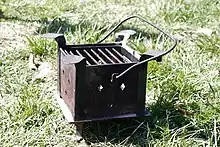brazier
See also: Brazier
English

Brazier with grill and pot rest
Alternative forms
Pronunciation
Etymology 1
From Middle English brasier, from brasen (“to make out of bronze or brass”), from Old English brasian, bræsian (“to cover with brass”), equivalent to brass + -ier.
Etymology 2
From French brasier (“pan of hot coals”), from Middle French braisier, from Old French brasier, from brese (“embers, hot coals”), of Germanic origin, ultimately from Proto-Germanic *brasō. See braise.
Noun
brazier (plural braziers)
- An upright standing or hanging metal bowl used for holding burning coal for a source of light or heat.
- 1886 October – 1887 January, H[enry] Rider Haggard, She: A History of Adventure, London: Longmans, Green, and Co., published 1887, →OCLC:
- One of them came forward, and, producing a lamp, lit it from his brazier (for the Amahagger when on a journey nearly always carried with them a little lighted brazier, from which to provide fire).
- March 1920, Alice Ballantine Kirjassoff, “FORMOSA THE BEAUTIFUL”, in National Geographic Magazine, pages 264–5:
- At almost any time, while the boats weigh anchor, a small party can be seen in the stern, clustering about a charcoal brazier- a woman busy dishing out bowls of soup and macaroni, and men in palm-leaf hats, their bronzed bodies stripped to the waist, hurriedly scooping up steaming threads with the aid of long wooden chop-sticks.
Translations
an upright standing or hanging metal bowl used for holding burning coal
| |||||
a worker in brass
See also
Anagrams
This article is issued from Wiktionary. The text is licensed under Creative Commons - Attribution - Sharealike. Additional terms may apply for the media files.